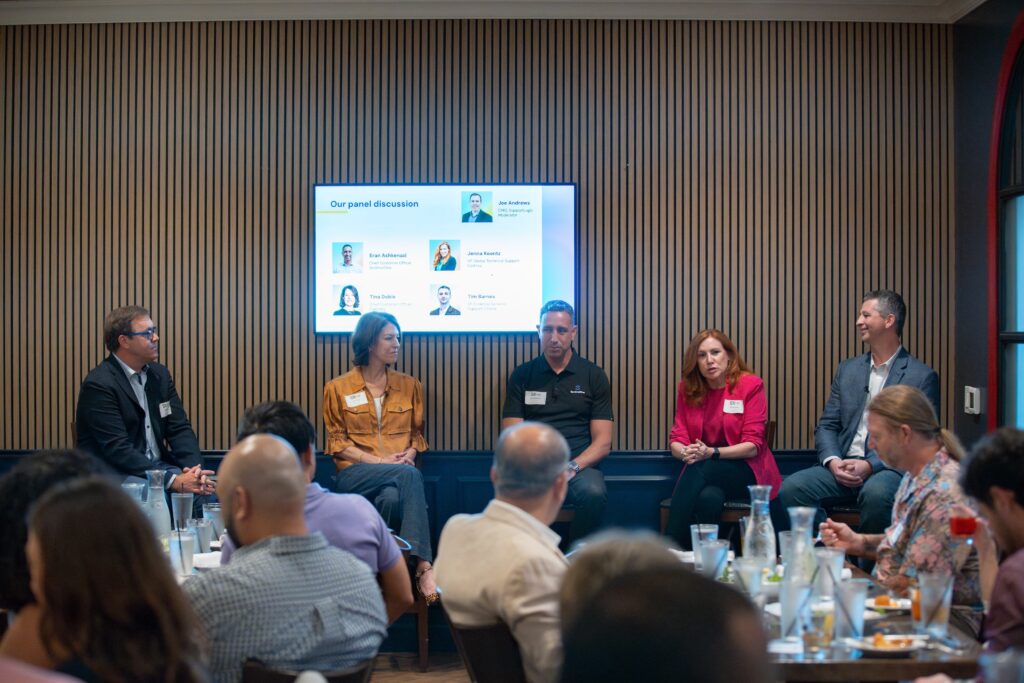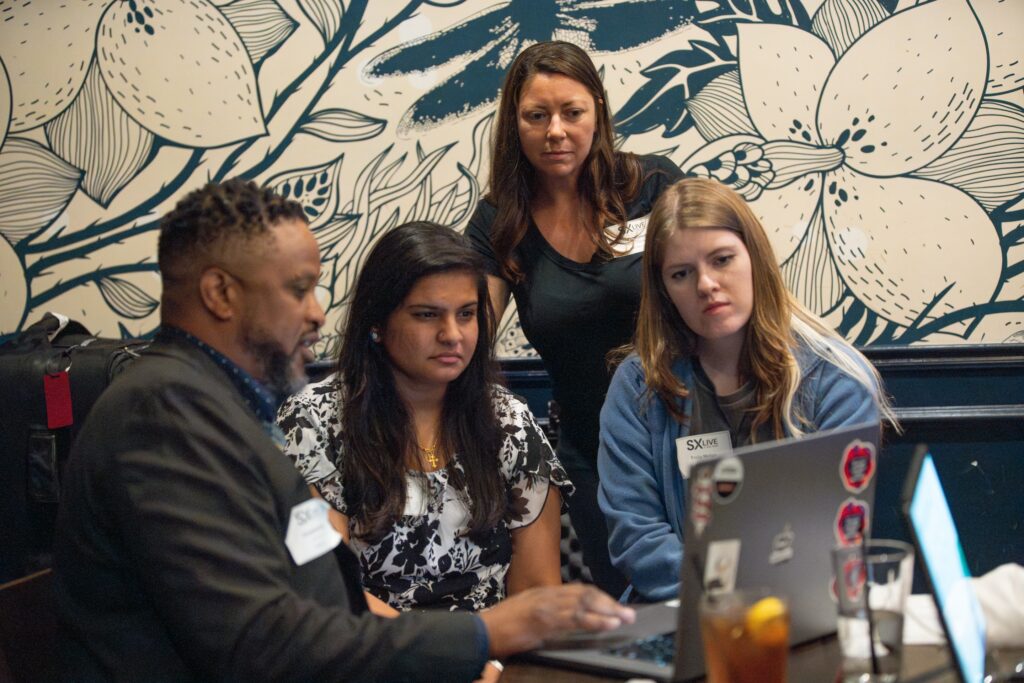
May 10, 2024
AI to Enhance, Not Replace, Complex Support Teams – Five Insights from SX Live Austin
Customer SuccessSupport Experiencecustomer experiencecustomer satisfactiongenerative AISX Live
At the SX Live event in Austin last week, the following support and success leaders gathered to discuss the impact of AI on the post-sales customer experience.
- Eran Ashkenazi, Chief Customer Officer at Sentinel One
- Tina Dobie, Chief Customer Officer at Calendly
- Tim Barnes, VP of Financial Services Support at Oracle
- Jenna Koontz, VP of Global Technical Support at Sur tinea
Throughout the lively discussion, the panelists shared their insights and experiences with implementing AI in their own organizations. They emphasized the importance of taking a pragmatic, customer-centric approach to AI, and using it to enhance the support experience rather than replace humans.
“I wake up thinking about how our customers are treated, the technology solutions that we’re bringing to them, how quick we were, the quality, both from a technical standpoint and from an engagement standpoint, what that looks like holistically,” said Koontz. “The entire journey, you really have to kind of map that journey.”
Dobie echoed this sentiment, “I think of it in terms of how we’re helping our customers and what I want to use generative AI for to be that front door of support. Not quite there yet. And then also the agent assists for internal usage, which we’re having really good luck with.”

The panelists also discussed the challenges of implementing AI, including concerns around data privacy and the need for organizational change management. “We really have to reframe those things and just talk about it with intention, and what it really means for you and your organization,” said Koontz. Below are our five key takeaways from the event:
1. AI Will Enable Us to Provide More Personalized and Proactive Service
By busting silos between support, customer success, and other functions, AI is enabling companies to take a more holistic approach to support. The panelists unanimously agreed that AI has the potential to revolutionize customer support by enabling more efficient, personalized, and proactive service.
Jenna Koontz emphasized the importance of using AI to “elevate that experience for our customers and capitalize on AI doing it right.” Tina Dobie highlighted the benefits of AI-powered agent assist tools, which can help support agents provide more accurate and timely responses to customer inquiries. “If you put the customer view first, then you’re going to make decisions about how the teams support that customer as opposed to the teams kind of coming first.”
2. Balancing AI Adoption with Data Privacy and Security is Crucial
While AI offers numerous benefits, the panelists acknowledged the importance of addressing data privacy and security concerns. Eran Ashkenazi stressed the need for companies to develop Gen AI policies related to security and privacy, especially when dealing with sensitive customer data. They also discussed strategies for anonymizing data and using in-house enterprise models to maintain data confidentiality. “Because we’re talking about Gen AI, I’d like to ask how many here know that their company actually has a Gen AI policy related to security and privacy. This is something that we had to construct and share with the entirety of the company”.
3. Successful AI Implementation Cannot Be One-Size-Fits-All
Introducing AI into customer support requires careful change management to ensure employee buy-in and adoption. Jenna Koontz shared her experience of addressing concerns within her organization, emphasizing the importance of communicating that AI is not about headcount reduction but rather about creating opportunities for employees to focus on higher-value work.
Implementing AI in customer support cannot have a one-size-fits-all approach. It requires a pragmatic, thoughtful strategy that takes into account the unique needs and challenges of each organization. “We actually coined the pragmatic AI approach internally,” said Koontz. “As we’re evaluating tools and assessing, we want that human touch, we want to lead with empathy.”

“I recently had to speak at a company town hall. And the topic was, of course, AI, because that is the topic du jour. And I didn’t consider the impact on my organization,” continued Koontz. “A lot of the survey feedback that we got was, ‘Is my job going away?’ So we really have to reframe those things and talk about it with intention.”
4. AI is Enhancing the Support Experience, Not Replacing Humans
While some may fear that AI will replace human support agents, the panelists emphasized that AI is actually enhancing the support experience by enabling agents to be more efficient and effective. Tina Dobie shared Calendly’s experience of experimenting with generative AI in their chatbot, noting that while they haven’t yet achieved the desired results, they remain optimistic about the technology’s potential. The panelists agreed – it’s essential to provide customers with the option to easily connect with a human agent when needed.
“We have been testing generative AI through that chatbot extensively. And I think it’s also okay to say that we haven’t found the solution that we’re looking for yet. Our declarative answers, which are the answers we write for the chatbot, have about a 92% deflection rate at this point, or a success rate. And the generative AI solutions that we’ve been testing have not been able to cross that bar yet,” said Tina Dobie.
5. The Future of AI May be Bright, But There’s Still Work to Be Done
The hype around generative AI has reached a fever pitch, and for good reason. As Joe Andrews pointed out, “It’s not hyperbole to say that we are hyped right now with generative AI.” But this hype is backed by real use cases and value that companies are already seeing. In fact, one-third of C-suite executives surveyed by Boston Consulting Group said they are increasing their investments in AI today.
While the panelists were excited about the potential of AI in customer support, they also acknowledged that there is still work to be done to fully realize its benefits. “I think it’s where imagination and vision meets reality,” said Eran Ashkenazi. “I hope it gets closer to our imagination and vision rather than just a 5% improvement.”
The panelists emphasized the importance of experimentation, keeping an open mind, and focusing on delivering tangible improvements to the customer experience. Jenna Koontz highlighted the potential of moving from generative to predictive AI and eventually to co-pilot capabilities, which could significantly enhance support agents’ effectiveness. “I think it’s going from sort of generative to predictive and then to co-pilot, which I’m super amped about. So I think that’s good, you know, basically generating or predicting or doing, and that next evolution is huge.”

Closing Thoughts
Despite these challenges, the panelists were optimistic about the future of AI in customer support. “I think the maturity of the products, the discussions that are happening in the past year has really accelerated and so I’m hopeful that those are all going to converge and it’s going to be embraced across not just support, but all the different lines of business,” said Tim Barnes.
As the event came to a close, the panelists were asked what they were most excited about in the next one to two years. Their responses ranged from experimentation and innovation to the convergence of imagination and reality. “I think it’s going from sort of generative to predictive and then to co-pilot, which I’m super amped about,” said Koontz. “So I think that’s good, you know, basically generating or predicting or doing and that next evolution is huge.”
As companies continue to experiment and innovate with AI, it’s clear that it will play an increasingly important role in shaping the future of customer support.
If you enjoyed this recap, the event video is posted over at the SX Live Library.
Don’t miss out
Want the latest B2B Support, AI and ML blogs delivered straight to your inbox?




